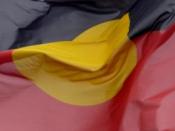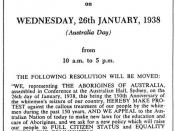January 26 was nominated as Australia Day to celebrate the anniversary of white settlement. It commemorates the ceremonious expansion of the British flag at the head of Sydney Cove by Governor Arthur Phillip in 1788. By the beginning of the 21st century, however, it is also recognised as a day of mourning for the invasion and dispossession of Australia's Aboriginal people.
The Centenary in 1888 was a proud celebration of British and Australian achievement. Aboriginal people boycotted the celebrated events but their absence went unnoticed by mainstream Australians. By 1938 though, Aboriginal people in Sydney were becoming more organised in their political activities. Bill Ferguson organised the first meeting of the Aboriginal Progressive Association in 1937 in preparation for an event to mark the 150th anniversary of the British arrival. Ferguson, William Cooper and Margaret Tucker organised "A Day of Mourning and Protest" and a conference for January 26, 1938.
This event was held in the Australian Hall at 150 Elizabeth Street after they were refused use of Sydney Town Hall. The meeting was the first Aboriginal civil rights gathering and was a major step towards redressing the wrongs of history against Aboriginal people. It attracted some 1000 Aboriginal men and women and was the culmination of ten years of action by Aboriginal people against the policies of the NSW Aborigines Protection Board.
The day also saw an appalling contrast. Aboriginal organisations in Sydney refused to participate in the Government's re-enactment of the events of January 1788. In response, the Government transported groups of Aboriginal people in from western communities to participate in their place. The visitors were locked up at the Redfern Police Barracks stables and members of the Aborigines Progressive Association were denied access to them.
The "Day of Mourning and Protest" made an impact, achieving both media...


